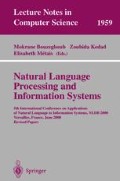Abstract
The formalization of periods of time inside a linear model of Time are based on the notion of intervals, that can or not contain their endpoints. It is quite insufficient when these periods are expressing in terms of coarse granularities with respect to the event taken into account. For instance, how to express the inter-war period in terms of a years interval?
This paper presents a new type of interval and the extension of operations on intervals to this new type, in order to reduce the gap between the discourse related to temporal relationship and its translation into a discretized model of Time in databases.
This work is partially supported by REANIMATIC project.
Access this chapter
Tax calculation will be finalised at checkout
Purchases are for personal use only
Preview
Unable to display preview. Download preview PDF.
References
Allen, J.: An Interval-Based Representation of Temporal Knowledge. In: proceedings of the International Join Conference in Artificial Iintelligence (1981) pp221–226.
Allen, J., Hayes P.: A common-Sense Theory of Time. In: proceedings of the International Join Conference in Artificial Iintelligence (1985) pp528–531.
Allen, J., Hayes P.: Short Time Periods. In: proceedings of the International Join Conference in Artificial Iintelligence (1987) pp981–983.
Bettini C., Wang S., Jajodia S.: A general framework for time granularity and its application to temporal reasoning. Annals of Mathemetics and Artificial Intelligence 22 (1998) pp29–58.
Bettini C., Dyreson C., Evans W., Snodgrass R, and Wang S.: A Glossary of Time Granularity Concepts. In Temporal Databases-Research and Practice. In Lecture Notes in Computer Science, Vol 1399. Springer-Verlag, Berlin Heidelberg New-York (1998) pp 406–413.
Dubois M., Schwer R. S.: Classification topologique des ensembles convexes de Allen. In: Proceedings of Reconnaissance des Formes et Intelligence Artificielle, vol III (2000) pp59–68.
Dyreson C. E., Snodgrass R. T. Valid-time Indeterminacy. In: Proceedings of the International Conference on Data Engineering. Vienna, Austria, (1993) pp335–343.
Euzénat J. An algebraic approach for granularity in qualitative space and time representation. In: Proceedings of the International Join Conference in Artificial Iintelligence (1995) pp894–900.
Hobbs J. Granularity. In: Proceedings of International Join Conference in Artificial Iintelligence (1985) pp432–435.
Jensen C. et al. The Consensus Glossary of Temporal Database Concepts. In: Temporal Databases-Research and Practice. In Lecture Notes in Computer Science, Vol 1399. Springer-Verlag, Berlin Heidelberg New-York (1998) pp 406–413.
Rudin W. Principles of Mathematical Analysis. McGraw-Hill. ISBN 07-085613-3,3rd ed.,1975.
Schwer S. R., Vauzeilles J.. Calendars inside the framework of finite ordinals category. In Proceedings of the Workshop Spatial and temporal reasoning. In: Proceedings of the European Conference in Artificial Intelligence (1998) pp65–73.
Wang S., Jajodia S., Subrahmanian V. S. Temporal Modules: An Approach Toward Federated Temporal Databases. In SIGMOD/5/93 (1993) pp227–236.
Author information
Authors and Affiliations
Editor information
Editors and Affiliations
Rights and permissions
Copyright information
© 2001 Springer-Verlag Berlin Heidelberg
About this paper
Cite this paper
Schwer, S.R. (2001). Temporal Granularity Enlightened by Knowledge. In: Bouzeghoub, M., Kedad, Z., Métais, E. (eds) Natural Language Processing and Information Systems. NLDB 2000. Lecture Notes in Computer Science, vol 1959. Springer, Berlin, Heidelberg. https://doi.org/10.1007/3-540-45399-7_3
Download citation
DOI: https://doi.org/10.1007/3-540-45399-7_3
Published:
Publisher Name: Springer, Berlin, Heidelberg
Print ISBN: 978-3-540-41943-3
Online ISBN: 978-3-540-45399-4
eBook Packages: Springer Book Archive

